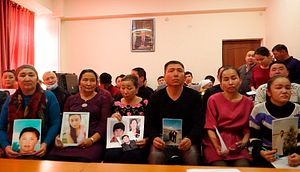Two stories published Monday — by AFP and Foreign Policy — provide the latest information on the evolving condition of Muslims detained in Xinjiang, via ethnic Kazakhs who have direct experience in the so-called vocational training centers, as the Chinese authorities call them, and the families of those who have disappeared into the Xinjiang camps. These stories also prompt the question of how long Kazakhs will remain a relatively easy window into the Xinjiang crisis.
AFP’s story focuses initially on Gulzira Auelkhan, a 39-year-old Chinese citizen of Kazakh descent who spend 15 months in two “re-education” facilities in Xinjiang before being transferred to work at a glove factory for far below minimum wage.
Chinese authorities denied the use of forced labor to AFP, much as they long denied the existence of the camps in Xinjiang. Beijing eventually came out in defense of what the media had begun to call “re-education centers,” though China used the term “vocational education and training centers.” Last November, as China’s human rights record came up for review at the United Nations Human Rights Council, Beijing dispatched a 66-person delegation.
Reuters quoted one Chinese delegate as saying that Beijing was “providing free-of-charge vocational training with a diploma after exams” to those who had been “coerced or lured” by extremist groups.
The denial registered by AFP from the Xinjiang authorities isn’t terribly convincing. Surely, we’ll eventually hear from Beijing that of course, after training at the vocational centers Xinjiang’s wayward Muslims, cured of their extremism, are given jobs.
A recent story published by Foreign Policy — reported by Reid Standish and Aigerim Toleukhanova — similarly starts with Auelkhan’s revelation of forced labor after internment at the Xinjiang camps, but then pivots to Kazakhstan, where she has been able to tell her story. Auelkhan’s husband is a Kazakh citizen and, as Standish and Toleukhanova report, she “credits her freedom to her husband… and his efforts in lobbying the Kazakh government for help and raising attention to her case on social media and by speaking to local and international journalists.”
In Kazakhstan (and Kyrgyzstan) there has been a growing advocacy network of activists and families focused on relatives held across the border in China’s Xinjiang. Ethnic Kazakhs and Kyrgyz detained in China have, at the very least, a state that can to a certain extent attempt to act on their behalf. This has had some individual successes, while having little impact on the overarching issue. Simply put: Astana cannot budge Beijing, but Beijing is certainly aware of Astana’s difficult position.
In this vein, in early January headlines proclaimed that China would allow 2,000 ethnic Kazakhs to relinquish their citizenship and leave, after the Kazakh Foreign Ministry confirmed December reports in local media. But AFP’s attempts to follow-up and clarify what had happened were rebuffed. Instead, reports indicate that those released from the camps simply move on to other kinds of confinement, like the forced labor described by Auelkhan or house arrest. In a cynic’s view, the reports of the 2,000 to be released reads like a placating measure, designed to deflect criticism of the state for not doing enough.
Meanwhile, Kazakh authorities aren’t doing advocacy groups focused on the Xinjiang issue many favors. As Standish and Toleukhanova reported, Serikzhan Bilash — the head of Ata Jurt, an organization focused on supporting the relatives of Kazakhs who have disappeared in Xinjiang — has faced increasing difficulties in carrying out the organization’s work. Critically, while Astana has tolerated the group in general, the Ministry of Justice has denied its attempts to register with the state. Last month the government fined the organization for being unregistered.
The increasing pressure on Ata Jurt and the illustrative tale of Sayragul Sauytbay — who, per an interview with Standish for a story published in early February, remains in legal limbo after having her asylum applications denied twice by Kazakhstan — add up to gathering clouds for Kazakhs concerned about their relatives in China.
When will the Kazakh window into Xinjiang close? The important factors to keep an eye on are how Astana responds to growing domestic concern about Xinjiang, how well (or not) Beijing tolerates Kazakhs speaking out about the situation, what kind of pressure Beijing may direct at Astana to quiet the noise, and what the state and public responses to such efforts will be. Kazakhstan’s authorities have little tolerance for public protests and Kazakh citizens have few avenues to influence their government’s actions.
Reports like those in Foreign Policy, by AFP, and by others are critical to global understanding of what’s happening in Xinjiang. They’re rooted in access to Kazakhstan and the courage of Kazakhs willing to speak up.

































